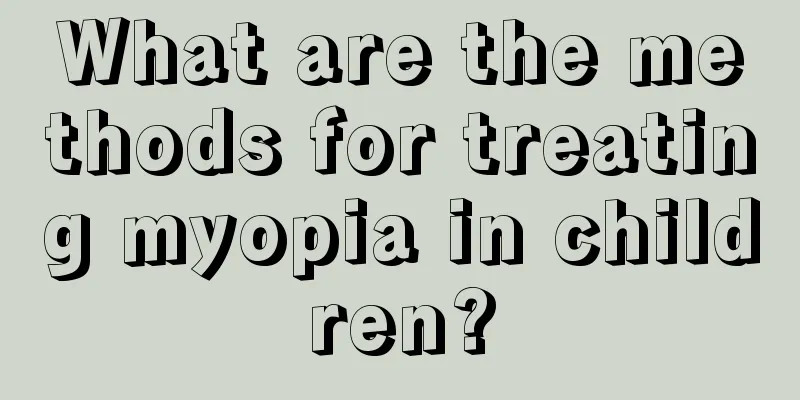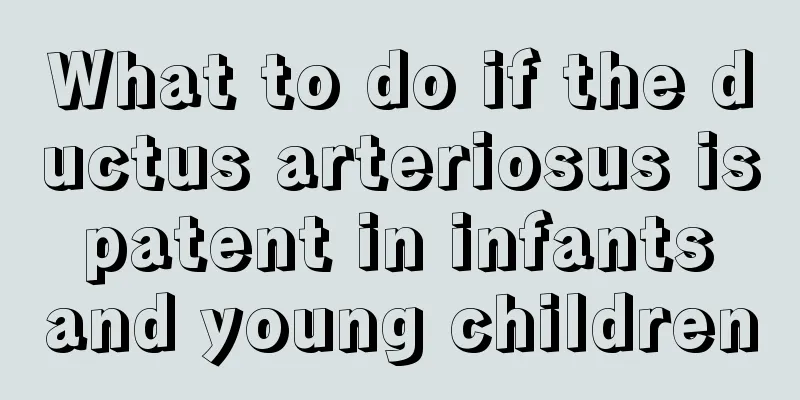What causes children to vomit?

|
Everyone is very familiar with vomiting. We have all vomited in our lives. Of course, there are many reasons for vomiting. Many people vomit due to overeating, cold body and some diseases. When a child has vomiting symptoms, parents should find out the cause of the vomiting and provide correct care. If the child's vomiting symptoms are severe, the child must be taken to the hospital for treatment. 1. Gastrointestinal obstructive vomiting It may be caused by congenital digestive tract malformations or certain acquired diseases that lead to digestive obstruction. (1) If a baby vomits during the neonatal period, the baby may have esophageal atresia, gastric torsion, pyloric spasm, pyloric valve, duodenal atresia or stenosis of the annular pancreas, intestinal malrotation, jejunal atresia or stenosis, rectal and anal malformations (including anal atresia or stenosis, etc.), gastrointestinal duplication malformations and meconium peritonitis. (2) Intestinal obstructive vomiting in infants and young children, congenital pyloric stenosis, delayed effusion of the pyloric synovium or pyloric spasm, intussusception and acquired intestinal volvulus. (3) Vomiting in childhood may be caused by external intestinal wall compression, adhesions after meconium peritonitis, preduodenal portal vein mesenteric hiatus hernia, incarcerated inguinal oblique hernia or diaphragmatic hernia. 2. Infectious vomiting Caused by upper respiratory tract infection, pneumonia and gastrointestinal infection. 3. Vomiting caused by central nervous system diseases Various encephalitis, meningitis, cerebral hemorrhage, brain tumors and intracranial hypertension. 4. Nutritional and metabolic disorders Infantile beriberi, uremia, metabolic acidosis, diabetic ketoacidosis. 5. Vestibular dysfunction Meniere's syndrome. 6. Drugs and poisons irritate the gastrointestinal tract. 7. Others Cyclic vomiting, recurrent vomiting. Treatment of vomiting in children 1. Children who vomit should lie on their side or sit up, and rinse their mouths with warm water after vomiting. Give the child a small amount of fruit juice and light salt water to drink. If the cause is due to improper diet, take a rest and reduce food intake. 2. After vomiting stops or is relieved, give a small amount of lukewarm, easily digestible food or liquid food such as rice soup. 3. Those with dehydration or electrolyte imbalance should be given fluid replacement and electrolyte imbalance should be corrected in a timely manner as needed. 4. Those who vomit frequently should be given antiemetics and sedatives. Such as Lumina, Hibernation Spirit, Metoclopramide suppositories, etc., use Metoclopramide with caution. 5. Antispasmodics, such as belladonna mixture, atropine 654-2, propantheline, and 1% to 2% procaine. |
<<: Children often vomit after eating
>>: How to regulate children's spleen and stomach disharmony
Recommend
What should children eat to recover quickly from bone fractures?
For children aged seven or eight, their favorite ...
What should I do if my child has a stomach upset? It is important to learn these methods!
Children's digestive system functions are not...
What to do if your child always loses temper
If a child always loses his temper, in addition t...
What should I do if my child has trouble sleeping?
We all know that sleep plays a very important rol...
Treatment of neonatal breathing with phlegm
Newborns' breathing with phlegm is one of the...
What causes cerebral palsy in children?
In fact, in many cases, cerebral palsy in childre...
Is it dangerous if the baby has a fever of 39 degrees?
Everyone must be familiar with the disease of fev...
Children's upper eyelids are red and swollen
No parents want their children to have health pro...
What to do if children have irregular heartbeat
Every child will have some problems in the proces...
Children's sinusitis anti-inflammatory medicine for one month
Many people believe that surgery is necessary aft...
Precautions for feeding premature infants at 31 weeks
Because every pregnant woman's physique is di...
Children love twitching when sleeping
Children are the treasures of every family and th...
6 home-cooked dishes to help children improve their brain power
All parents want their babies to be smart, but th...
What should you pay attention to when your child loses teeth?
Only by having healthy teeth can you ensure a nor...
What are the benefits of soaking your child's feet in mugwort leaves?
What are the benefits of soaking children’s feet ...









